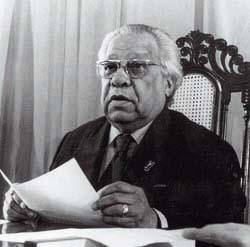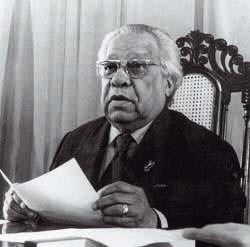
Havana, Thursday July 16, 2009. Year 13 / Number 197
Death of Nicolás Guillén?
by Nancy Morejón, National Literature Prize
A CubaNews translation. Edited by Walter Lippmann.
Commemorating the twentieth anniversary of his decease compels us to study his poetic and journalistic work on a systematic basis and to spread his legacy, originality, vocation and political commitment.
 July 16, only a few
hours away, will mark the 20th anniversary of the death, in Havana, of
Nicolás Guillén, the great Cuban poet who sang the praises of his
country. It’s toward his life and work, which outshine even his own
death, that we intend to draw people’s attention in Cuba and outside
since this could be an exceptional opportunity not only to set in relief
his beautiful memory as a citizen and the most essential values of his
entire work, but also to revive his bibliography, iconography, historic
dimension and literary history.
July 16, only a few
hours away, will mark the 20th anniversary of the death, in Havana, of
Nicolás Guillén, the great Cuban poet who sang the praises of his
country. It’s toward his life and work, which outshine even his own
death, that we intend to draw people’s attention in Cuba and outside
since this could be an exceptional opportunity not only to set in relief
his beautiful memory as a citizen and the most essential values of his
entire work, but also to revive his bibliography, iconography, historic
dimension and literary history.Just to commemorate the centenary of his birth, for instance, countless essays, articles and reviews were published and plenty of forgotten pages, documents, anecdotes and interviews were found, a true tidal wave of inquiry and research primarily focused on the study of his texts and how they are received among the young generations a few years into the 21st century.
Today we applaud and thank Ángel Augier for his efforts to keep up to date –and his methodical classification of– all systematic studies of Guillén’s huge literary production. Saving the lifetime’s output of a sui generis poet who is as much Cuban and universal and he is Caribbean, and doing it in a transparent and truthful manner to boot, was and must continue to be our order of the day.
In this regard, Nicolás Guillén’s case is unique in that he became a celebrity at a very early age, and his poems have since been on everyone’s lips, to the point that they live on in Cuba’s collective consciousness. That’s precisely why this coming homage should include a revision of curricula at all levels of our schooling system to make sure they cover his texts.
Guillén is known to have been not only the author of one of poetry’s most typical innovations of early twentieth-century Cuba: his poetic voice would soon highlight as well our culture’s kinship with the Caribbean and the rest of the Americas.
In addition to outstanding as a major accomplishment of Cuban music, his whole literary work subsisted on his eagerness to service the most progressive causes facing Cuba and the human race. Some of his poems no doubt pointed the best course toward our patriotic feelings and the triumph of the Revolution in 1959 as a fundamental chapter marking the culmination of longtime endeavors taken on by no end of generations of Cubans.
This tribute twenty years after his death would thus be aimed at taking stock of his unquestionable artistic achievements. It becomes an appeal to study his poetic and journalistic work on a systematic basis and spread his legacy, originality, vocation and political commitment.
With these we can not only make of his memory a big national palm tree, but also approach him as the great globetrotter that he was. His fame reached the farthest corners of the planet since the 1950s and never stood still until he became immortal. We must must make even aspect even more human, effective and generous than it ever was as we stamp out all sorts of stereotypes, whether deliberate or unintended.
http://www.granma.cubaweb.cu/2009/07/16/cultura/artic01.html
|
| [http://www.granma.cubaweb.cu/2009/07/16/base.htm] | ||
 Este
16 de julio, en menos de veinticuatro horas, se
cumplirán veinte años de la muerte en la ciudad de La
Habana del gran cantor de las gracias de Cuba, el poeta
Nicolás Guillén. Hacia su vida y su obra, más
trascendentales aún que su muerte, hemos querido
inclinar la atención de la opinión pública dentro y
fuera del país porque, amén de que necesitemos
restablecer su bibliografía, su iconografía, su
dimensión histórica y su historia literaria podría ser
ésta una excepcional oportunidad para fijar no sólo su
hermosa memoria ciudadana sino los más esenciales
valores de toda su obra. La simple conmemoración de su
centenario, por ejemplo, generó un sinnúmero de ensayos,
artículos, revisiones críticas, revelaciones de páginas
olvidadas, de hallazgos de documentos, anecdotarios,
entrevistas, en fin, toda una ola de estudios e
investigaciones cuyo fin inmediato fue el análisis de
sus textos junto al de la actual recepción de su obra
ante las generaciones más jóvenes al comienzo del siglo
XXI. Hoy aplaudimos y agradecemos la obra de Ángel
Augier que ha mantenido al día la observación, los
estudios sistemáticos y la clasificación rigurosa de esa
vastísima producción literaria. Rescatar con
transparencia y veracidad la trayectoria de un poeta
sui géneris, cubano y universal; nacional y
antillano, era y debe seguir siendo la palabra de orden.
Este
16 de julio, en menos de veinticuatro horas, se
cumplirán veinte años de la muerte en la ciudad de La
Habana del gran cantor de las gracias de Cuba, el poeta
Nicolás Guillén. Hacia su vida y su obra, más
trascendentales aún que su muerte, hemos querido
inclinar la atención de la opinión pública dentro y
fuera del país porque, amén de que necesitemos
restablecer su bibliografía, su iconografía, su
dimensión histórica y su historia literaria podría ser
ésta una excepcional oportunidad para fijar no sólo su
hermosa memoria ciudadana sino los más esenciales
valores de toda su obra. La simple conmemoración de su
centenario, por ejemplo, generó un sinnúmero de ensayos,
artículos, revisiones críticas, revelaciones de páginas
olvidadas, de hallazgos de documentos, anecdotarios,
entrevistas, en fin, toda una ola de estudios e
investigaciones cuyo fin inmediato fue el análisis de
sus textos junto al de la actual recepción de su obra
ante las generaciones más jóvenes al comienzo del siglo
XXI. Hoy aplaudimos y agradecemos la obra de Ángel
Augier que ha mantenido al día la observación, los
estudios sistemáticos y la clasificación rigurosa de esa
vastísima producción literaria. Rescatar con
transparencia y veracidad la trayectoria de un poeta
sui géneris, cubano y universal; nacional y
antillano, era y debe seguir siendo la palabra de orden.